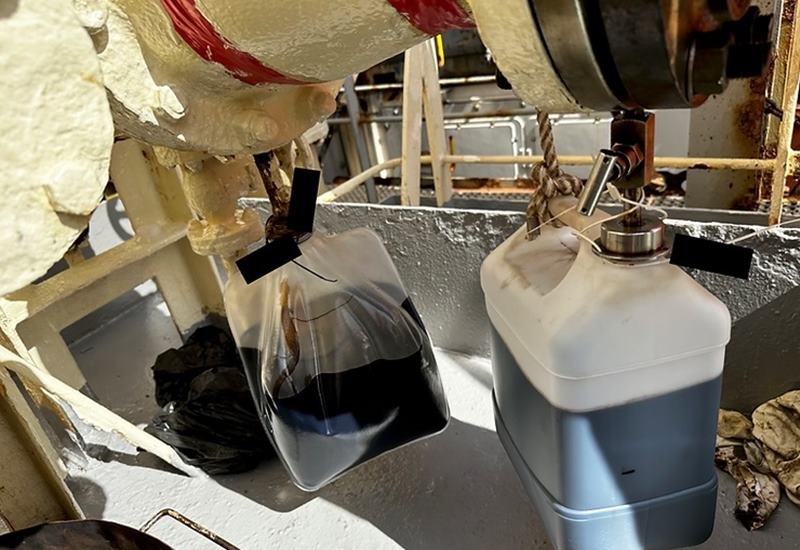The Global Centre for Maritime Decarbonisation (GCMD) has successfully completed trialling two supply chains of biofuel blends sourced from different origins. The supply chain trials encompassed tracing biofuels from their production sites outside Singapore, to Singapore where the fuels were blended and bunkered. Lab testing of the fuels continued until they were consumed onboard. These trials took place from 31 October 2022–15 February 2023 and involved five vessels; approximately 4,700 MT of sustainable biofuel blends were bunkered, the last batch of which will be consumed by end of February.
Operationalising the trials together with our project partners
Two sustainable biofuel blends were used in our trials. One is Used Cooking Oil Methyl Ester (UCOME), a type of Fatty Acid Methyl Ester (FAME), blended with Very Low Sulphur Fuel Oil (VLSFO); the other is UCOME blended with High Sulphur Fuel Oil (HSFO). The UCOME used in both biofuel blends is produced from residue or feedstocks labelled 100% waste and is ISCC certified.
In the first supply chain, Chevron provided B24 VLSFO (24% biofuel blend) to CMA CGM Maupassant and MOL Endowment, the latter a vessel operated by ONE. Additionally, Chevron bunkered B20 HSFO (20% biofuel blend) in its own Singapore Voyager and in Elizabeth I.A. that is owned by Angelicoussis Group and managed by its oil tanker shipping unit, Maran Tankers Shipmanagement. In a separate supply chain, TotalEnergies Marine Fuels provided B24 VLSFO to Lycaste Peace that is owned by NYK and chartered to Astomos Energy Corporation.
GCMD as a neutral convenor
The supply chain trials were undertaken under business-as-usual conditions in which individual fuel purchasers nominated their fuel suppliers of choice, and bunkering took place with vessels on commercial routes. GCMD brought together marine fuel purchasers and suppliers, and balanced the dynamic needs of the many diverse stakeholders, vessel schedules, equipment and asset availabilities, spanning geographies and factoring in contingencies to complete the two supply chain trials. Alongside, GCMD coordinated with the surveyors, tracer technology and laboratory test providers to enable end-to-end tracing of biofuels during these trials. Collaborating and sharing transparently with willing project partners enabled these trials to take place successfully despite the complexities of the marine fuel supply chain and uncertainties in bunkering operations.
First announced at the end of July 2022, the full pilot involves 19 industry partners, with 13 vessels spanning the container, tanker, and bulker segments bunkering in Singapore and Rotterdam. The completed trials represent two of the five supply chains in the full pilot, which aims to establish an assurance framework for the supply chain of sustainable biofuels. This framework, to be further developed by GCMD and its partners, will also provide emissions abatement assurance for future synthetic and bio-derived drop-in fuels.
Ensuring traceability of sustainable biofuels supply chains
To ensure transparency and integrity of the supply chains for biofuels and biofuel blends from end-to-end, GCMD deployed a range of tracing techniques, including dosing with physical tracers, fingerprinting, and deploying a lock-and-seal methodology, all of which were complemented with laboratory testing and analyses at numerous pre-determined points from fuel production to consumption. The strong collaboration GCMD fostered with the marine fuel suppliers and purchasers ensured that the physical tracers were added, and biofuels and their blends were sampled as planned. This important partnership also allowed collection of shipboard samples and data along voyages so GHG emissions can be appropriately quantified. In addition, VPS witnessed the biofuel bunkering operations at all stages from source to supply, and conducted extensive laboratory tests to assess the quality of the biofuel and their blends.
On lessons learned with the completion of two supply chain trials, Dr. Prapisala Thepsithar, director of projects at GCMD and project lead on this drop-in fuel assurance pilot, said:
“Through these trials, we have gained a better appreciation of the complexities of real-world operations. We have learned the hard lesson that not all tracing techniques are directly applicable for tracing sustainable biofuels as they stand, and we are currently undertaking efforts to refine their deployment. I am grateful for the support from and flexibility of our project partners in overcoming the roadblocks encountered during our trials. These learnings will inform our subsequent trials in the months ahead.”
Over the three months during which the trials took place, the quality of the biofuel blends remained stable. With the data collected from the completed trials and additional data to be collected from the three other supply chains, GCMD is working with Boston Consulting Group (BCG), one of its Impact Partners, to develop a robust framework for GHG accounting and conduct cost-benefit analysis of deploying biofuels.
On GCMD completing its trials for two supply chains of sustainable biofuels, Dr. Sanjay Kuttan, CTO of the Global Centre for Maritime Decarbonisation, said:
“The lack of assurance on the quality, quantity and emissions abatement of biofuels is a painpoint we identified from interviewing more than 100 industry stakeholders. These trials were curated to address this gap. In developing a framework to provide transparency and bolster the integrity of the biofuels supply chain, we hope to increase user confidence and decrease the barrier for wider adoption.”
Source GCMD Global Centre for Maritime Decarbonisation

